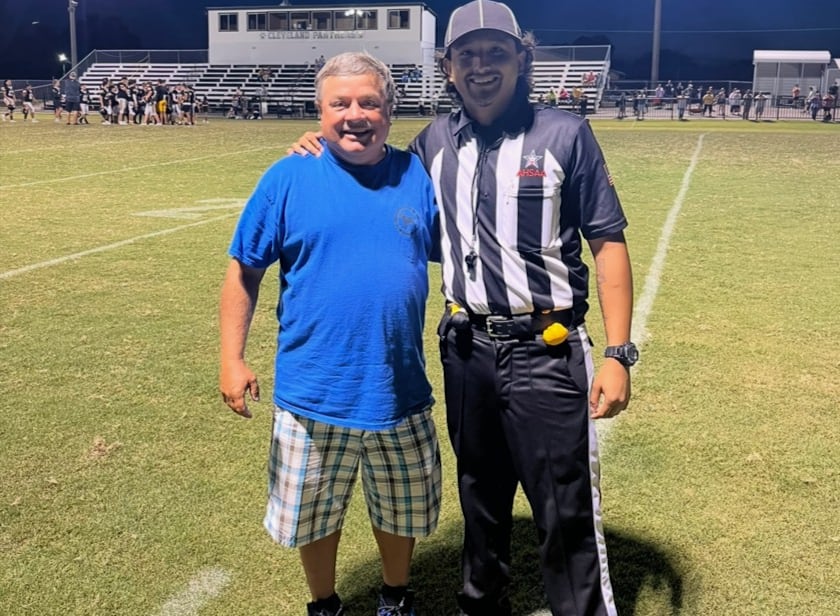Alfonso Fonzie Andrade spent last month preparing for a new refereeing season.
He has been working football games for the Alabama High School Athletic Association for six years. His American Dream.
He read the new regulations, such as the one that modifies the position of balls that are mishandled out of bounds. He combed over footage to comprehend the lineups of the teams he was tasked with officiating. He also needed to be in shape. As a back judge, he was adamant about never allowing a player to back him down. He had to be upfront about everything.
Much like his life.
Fonzie has no notion what the future holds. He has been held at the Central Louisiana ICE Processing Center, a detention facility for people being forcibly removed from the country, for about two weeks. He is light years away from a future he believed he could envision, and seven hours away from his fiancée and child. Next Wednesday is his formal deportation hearing.
His native language is English; he has trouble reading and writing Spanish. His only house has been in rural Alabama.
“I’m fighting for my freedom and my life,” he declared. Because I lack control, I’m afraid.
After his family immigrated to the United States when he was one year old, Fonzie was brought up as an American. He was raised and educated in Blount County.Although he has committed a few misdemeanor marijuana crimes, they are not serious enough to ruin the lives of the majority of his pals. He is detained, however, and worries about what will happen to him and his family if he is abandoned at the Mexican border and left on his own.
Associated with: Small town ICE came for Fonzie even though he only knows Alabama as his home.
Everyone has seen news reports and footage of masked ICE officers making arrests all around the nation, but what does it look like when the cameras are not rolling? How does a detention facility in the United States feel? Fonzie Andrade was asked to explain it to me.
He wrote as follows:
My days are terrible, long, and depressing. I seem to be losing my sense of time here. There are five toilets, six showers, five useable sinks, 95 bunk beds, and windows that are about three feet long and two inches broad.
Every day, people are deported back to their home countries, but there are also fresh arrivals every day. Four walls, a number of beds, and a group of men ready to go are what I see. Ninety-eight percent of the population is returning home. I’m just attempting to come to terms with the possibility that I might be the 98% or perhaps the 2% who can remain in my nation of origin. In any case, I will be here for the next four to six months or more, seeing the same walls, eating the same meals every day, and fighting for my life in order to remain in Alabama.
This TV has no sound unless you purchase a radio and headphones. You will be awakened by the loud noise of the toilets here. I’m constantly thinking about the good, the terrible, and the what-ifs.
I have the same tightness and knots in my stomach and chest when I go to sleep and when I wake up. I sometimes feel like these walls are closing in, so I go take a shower to help me conceal and maintain control. The fear of not knowing when I’ll be able to hold Bralie and my children may be the cause of my anxiousness. All I want to do is cry and yell and scream. since I was doing well. At last, I was being the man I had always hoped to be.
Bralie Chandler, Fonzie’s fiancé, has paid two visits—once alone herself and once with their one-year-old son Glen.
She claimed that he began sobbing uncontrollably because he was unable to touch his father and was attempting to reach him by climbing over the glass. Eventually, though, he relaxed and simply continued kissing him through the glass.
Look, I’m not attempting to alter your mind about the concept of a “land of opportunity,” intricate immigration policy, politics, or criminal justice. Not right now. I would like you to consider a family for a moment.
Due to the circumstances surrounding his birth, Fonzie, who earned his nickname at Blountsville Elementary School, played football at J.B. Pennington High School, attended church there, and developed friends there, faced months in prison and exile from his family. This young man is not the only person impacted by the decision.
Many people have contacted Fonzie in Blount County and beyond. Many others have inquired about him. If he could, I asked him what he would say to them.
I have to remain strong for my son, my fiancé, and everyone else who is concerned about me, even though some days are better than others. Both my life and the lives of my loved ones will be significantly impacted by these upcoming months. I hope for the best, which is to be able to remain in Blountsville at home. My friends, family, and entire life are there. Please keep praying for me, my friends, and my family. Many thanks to all of you.
John Archibald has won the Pulitzer Prize twice.
Most Popular Stories by
John Archibald
-
Small town Alabama is the only home Fonzie knows, but ICE came for him anyway
-
Archibald: When bombs shook the South, and an unsung hero stepped up
-
Archibald: It s always 1984 somewhere
-
Archibald: Tommy Tuberville s blunder of Biblical proportions
-
High-priced Alabama lawyers apologize for AI snafu, throw colleague under the bus
Get John’s weekly email, delivered to your inbox every Tuesday morning, for free.
You accept our user agreement and privacy policy by registering.






